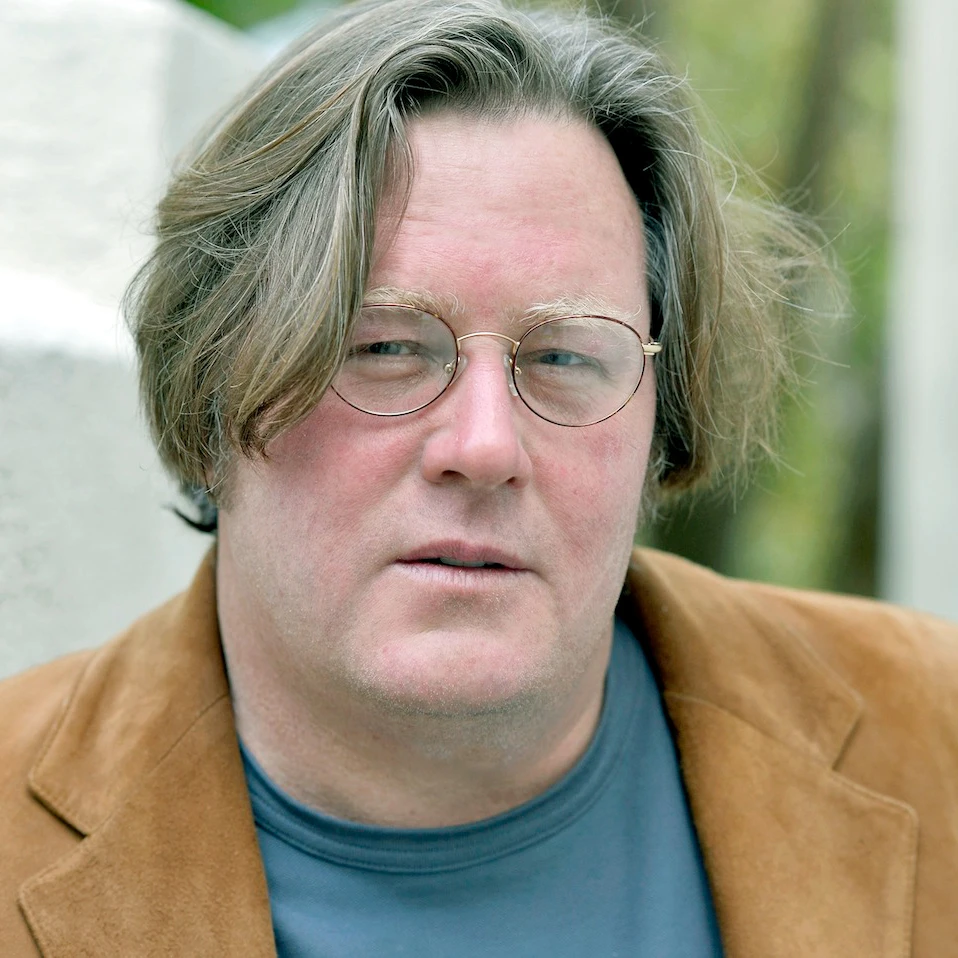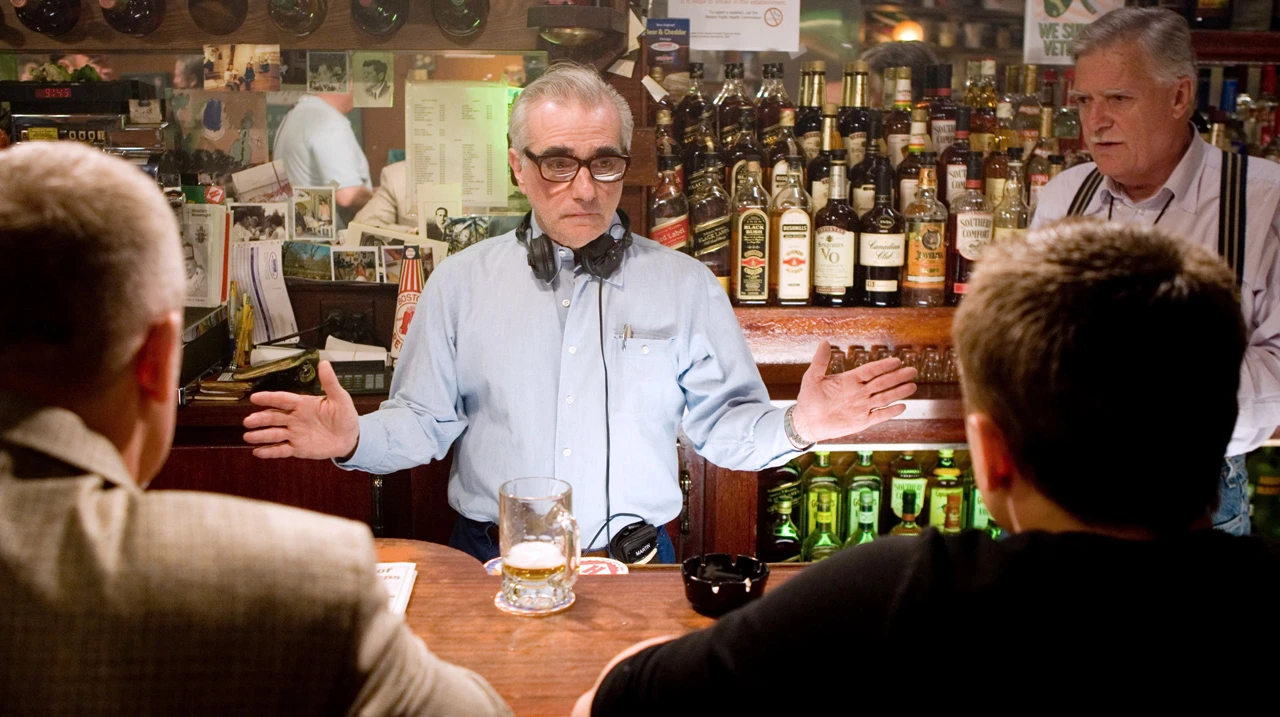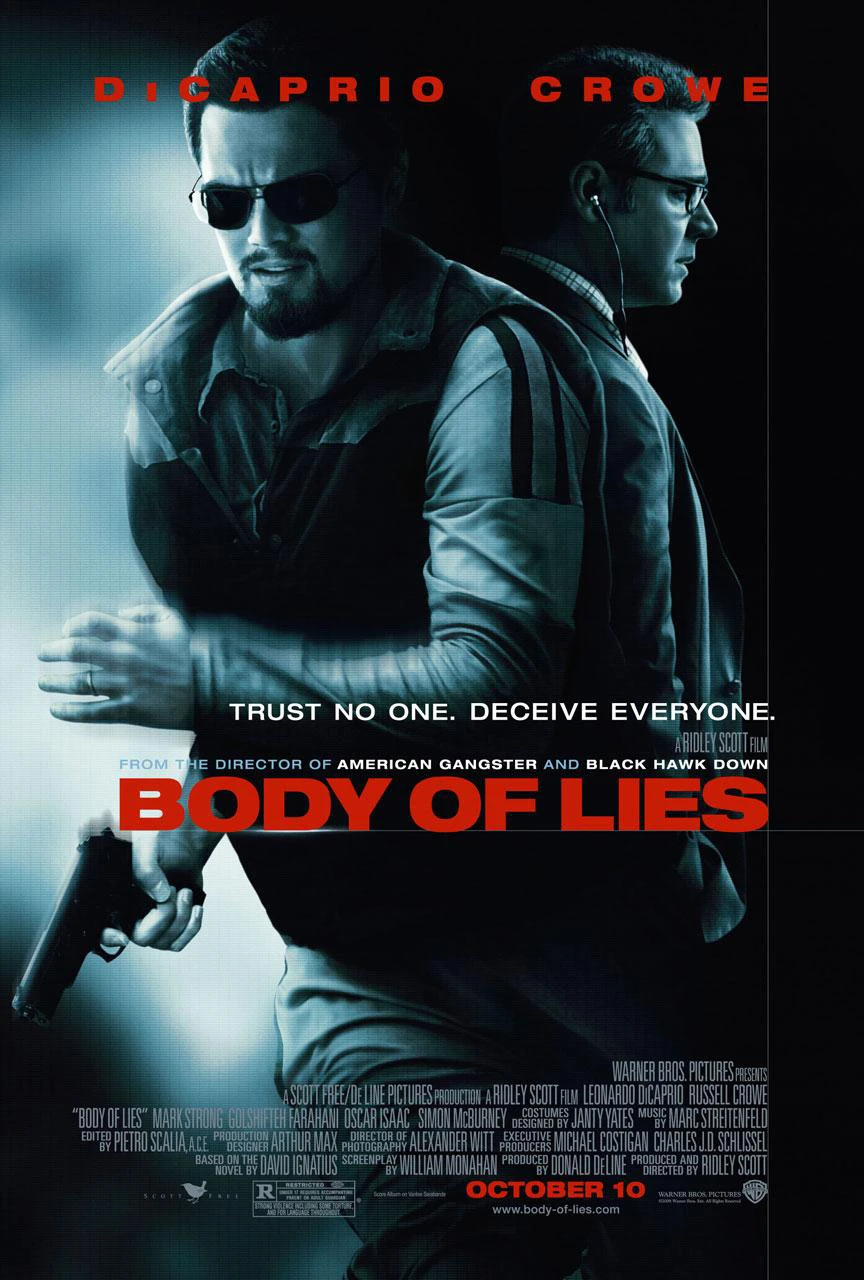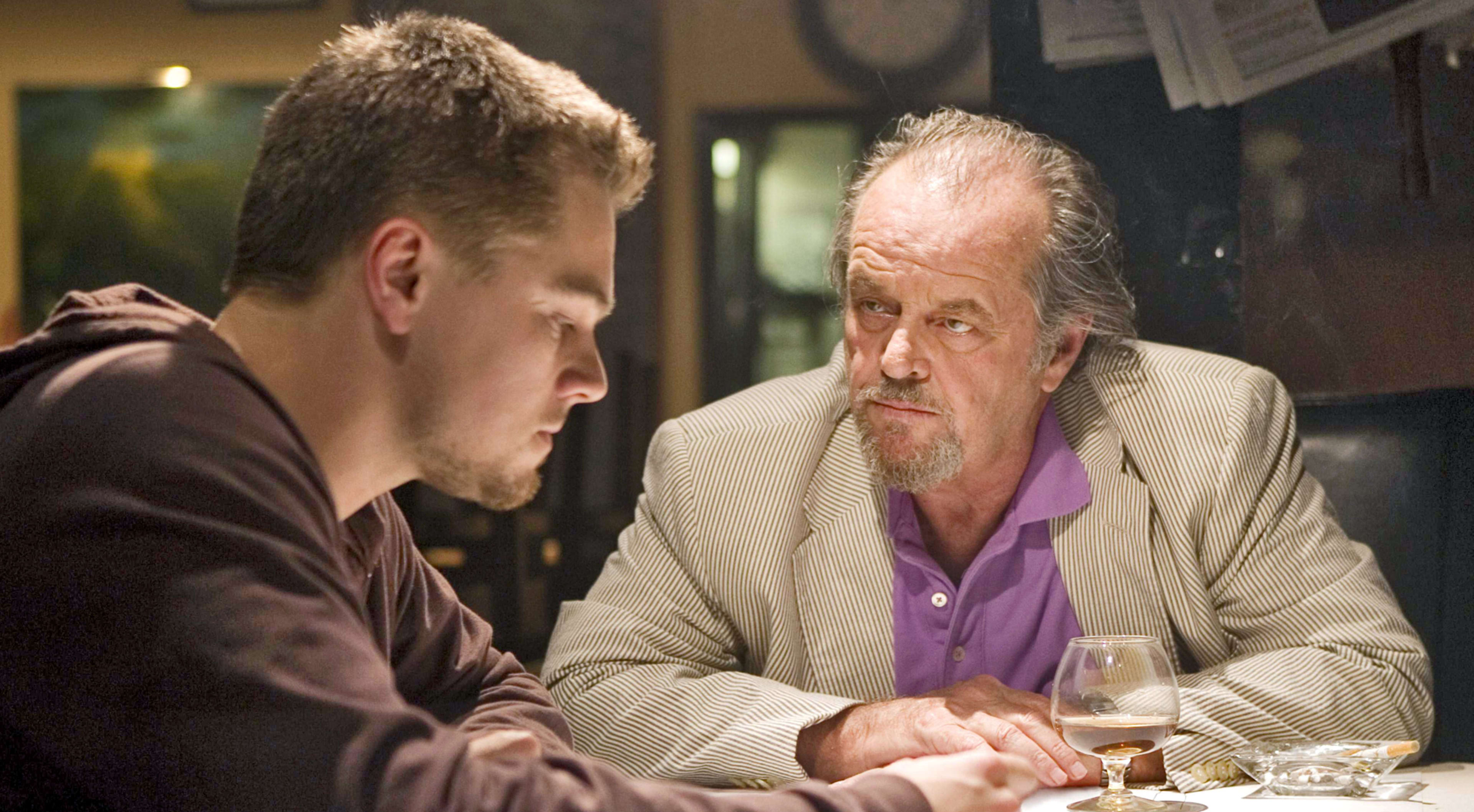“I don’t want to be a product of my environment. I want my environment to be a product of me.”
–Frank Costello (played by Jack Nicholson), The Departed
The Academy may have selected a silent film, The Artist, as the Best Picture of 2011, but that was an aberration–one of Nassim Taleb’s black swans. Ordinarily, there’s no overstating the importance of the characters’ words in a film. Let’s give it a try, though.
Dialogue is the backbone of every movie. It had better be strong too, because it has a lot of work to do. Dialogue needs to be believable, it has to define the characters (without explicitly doing so), and it must advance the plot. Ideally, it should also be entertaining, with memorable lines that sound even better over repeat viewings. If that all sounds like a tall order, it is, but it’s one that writer/director William Monahan has delivered on.

The script Monahan wrote for 2006’s The Departed is a concerto of profanity in E minor, a molotov cocktail of tension that leaves quotable lines strewn in its wake. It helped propel the film’s director, Martin Scorsese, to his first-ever Academy Award, and netted one for Monahan too for Best Adapted Screenplay. Since then, the writer has kept busy with Edge of Darkness, and Body of Lies, and his first directorial effort, London Boulevard. He also has a big 2013 on deck, starting with the Tom Cruise sci-fi adventure Oblivion in April. Monahan recently put down his pen for a moment, though, to offer some lessons on writing movie dialogue.
Listen to What’s Around You
Listen to people very carefully. Listen to what they’re saying and what they’re not saying with equal interest. A few weeks ago I actually overheard a very stupid man being coached for marriage counseling by a hippie who was even thicker than he was. It was pure gold and I know I’m going to use something like it, somewhere. This is why you have to live in cities. To listen.
Dialogue Reveals What Characters Hide
What I find really interesting is what characters don’t reveal, what people try to conceal. Everybody is always trying to hide something, and you can show that through dialogue. It’s not only politicians and advertisers and lawyers who shade the truth or have an agenda–it’s everybody.
Quite decent people often don’t realize that their conversations are not about truth or communication but advancing their own mythologies. Look at what people are trying to conceal, and you’ll see that they’re revealing everything. One of the funniest things in the world these days is that you go into a restaurant and at the next table there’s always a first date going on between people who met online and neither of them are telling the truth about anything whatsoever, even if they’re trying.
Natural Dialogue Is Boring
What you’re doing in essence is fundamentally unnatural. Nobody is doing less natural dialogue than Shakespeare, but he’s the best dialogist that’s ever lived–still is. You don’t want to hear the way that people really talk. Look at me now. I’m not exactly talking in rolling periods or Augustan phrase. I’m just sort of bumbling around. That’s what most people do in real-life conversations. Unless you’re Christopher Hitchens, who speaks in whole paragraphs, or God bless him, used to speak in whole paragraphs. You’re sort of fumbling around for meaning, whereas in written drama, you have to get at it.
Writing Dialogue is Improvisational
There aren’t any character elements that you put together somehow to make a credible human being. You are the character as you are composing the piece. You become the characters you are writing. Everybody is you. Either because it always was you, or an aspect of you, as some of my heroes can be, or because you utterly inhabit other personalities as an actor can and does and as writers can and do.
Someone who is good at improv, for instance, absorbs and absorbs and absorbs. And then all of a sudden they can just get up and do it. Bits and pieces assemble from everywhere and you never know when they’re gonna become useful.
It’s probably no joke that Shakespeare was an actor, because the first actor is always the writer. The writer has to perform all his people on the page. And he has to perform them really well, or the actors won’t be attracted to want to perform those people, and the film will never be made. So essentially, you’re doing in your own room and obviously your own head, a theatrical performance, except just projecting it on the page in an imagined movie, while being all the people.

Writing Dialogue Is Intuitive
Basically you hit a point–any artist sort of hits a point–where you’re post-intellectual about craft. It just happens. Whenever the point was, whenever the wall was that you broke through, you cease to be able to view things in a material way, and it’s merely this thing that you do intuitively.
Songwriters are very interesting people to look at when you’re examining art of any kind, because yes there was this and that in the newspaper, and yes you’d been playing with a chord change, but mainly it was a mood you were in at your kitchen table and there you are having A Day in the Life instead of not having it, and you’ll be damned if you can tell anybody why or how. In medieval times an art or craft was called a “mystery,” and there was and is a reason for that.
Start From Scratch With Dialogue in Adaptations
There was a 70-80 page really bad English translation of the film that became The Departed–sort of a transcript. The curious thing that happened was that at the time I’d been thinking about doing something about Boston; about being in my 20s in Boston, the double-lives that have been led in Boston, because we’re the only city in the United States that really has an accent-based class system. Suddenly what I was thinking about doing just collided with the opportunity to take up this adaptation. There was a terrific story structure in the original, but the people in the final film are absolutely all Bostonians. Inhabitants of that planet.
People In Your Life Will Inspire Speech Patterns
My dad has been dead for 20 years but he’s appeared in feature films twice. The main character in Edge of Darkness causes anyone who knew my father to sort of grin. He’s really my link to Boston. It’s a whole culture, a whole world of the way these people speak in Boston, and the way I speak when I’m among them. It’s a fact of Massachusetts life that you can go through an ordinary day with your accent mutating depending on who you talk to. My dad was a very typical Boston Irish guy. If you mentioned something, he didn’t want any part of it. “I don’t want any paht of it.”
I attempted to conceal the autobiographical elements of Leonardo DiCaprio’s character in The Departed by naming him Billy. I was, in my 20s, very much that sort of guy.

Dialogue Changes On Set
One of the finest things in the world is working with actors. You’re both essentially doing the same thing. I have been for a year the person the actor now has to be. I want to hear what he has to say about it, and he wants to hear what I have to say about it, hopefully. Having directed a movie, I changed things myself all the time. I’d think of a line and run out, and say, “Try this instead.” Things occur to you as you see how the dynamic works.
Sometimes dialogue changes on set. If you notice, a couple of Jack’s scenes in The Departed, there seem to be a certain natural cutpoint, and then there’s something additional. So, you’ll see in the scene in the bar, where he stops and says to the guy, “How’s your mother?” and he says “She’s on her way out,” and he says, “We all are–act accordingly.” As written, he just stepped out of the shot and was gone, because that’s a natural cut of the scene. But then you’ll see a little business following that. It was something Jack wanted to do. I want to see what Jack wants to do as much as anybody else does.
Table Reads Reveal a Lot About the Actor and the Character
I’ve seen in some crappy screenwriting books, “Be sure and read it aloud.” But sometimes you don’t have to do that because you know it already. If you have a facility for it, you hear it in your head as you write it. The best thing you can do, though, is sit down with your actors and do a table read. Then make your adjustments, either according to the requirements of the character or the natural patterns of the actor.
Don’t Necessarily Write for Specific Actors
I don’t think any actor would appreciate your writing for them. I think they want to play somebody else–that’s what they’re there for. In the older days there was the whole movie star thing, where the star was basically the same thing in every movie. But you have people like Michael Caine who can take anything written any way it’s written and turn it into Michael Caine. He’s a great guy to look at in terms of film dialogue and how it’s delivered. He was the first gut to really break the transatlantic curtain in a way by making sure that he articulated very precisely. If you listen to him, he breaks sentences up into two and three word chunks and says them very slowly. So he’s like the only English guy who’s ever been entirely comprehensible in America.

Mix High-Brow and Low-Brow
Sometimes a movie can be taken apart by influence in the script level, or they can be taken apart in the editing level. You don’t know what the sales agents have sold to India. There has to be one print for the entire world. In post, money is spent on ADR for different countries, not cuts for different countries, so films sometimes get ground down in the sense that sometimes more intelligent lines are taken out in the mistaken belief that they won’t be comprehensible to people, and that’s generally untrue. I think The Departed is a good example of a way to mix high and low to a good effect to a general audience rather than just aiming for low, as in the lowest common denominator, which is where most films are aimed.
Do Your Homework. And Work. Like A Bastard
The most important thing is to read truly great dialogists and set yourself a very high bar. You can’t set yourself a high bar unless you’re aware of the very highest standards in dramatic writing, and that means a pretty awesome degree of literacy. And I mean literacy, not cineliteracy.
I don’t know if I was born with a knack, or a natural interest that led to an ability–the answer to the nature/nurture thing is that it’s both–but I do know that I’ve worked like a coal miner for thirty-odd years and that I sacrificed a very great deal. I had to entirely give up my twenties to be what I started to become in my mid-thirties, when I became a screenwriter, in the sense of open vocation–and that’s basically the same level of commitment as becoming an eye surgeon, with none of the societal understanding that you’re doing something that will pay off. I knew I had something that you could call a “knack.” But then I worked harder than anybody else I knew, and I risked everything.
Recognize your brand’s excellence by applying to this year’s Brands That Matter Awards before the final deadline, June 7.
Sign up for Brands That Matter notifications here.
